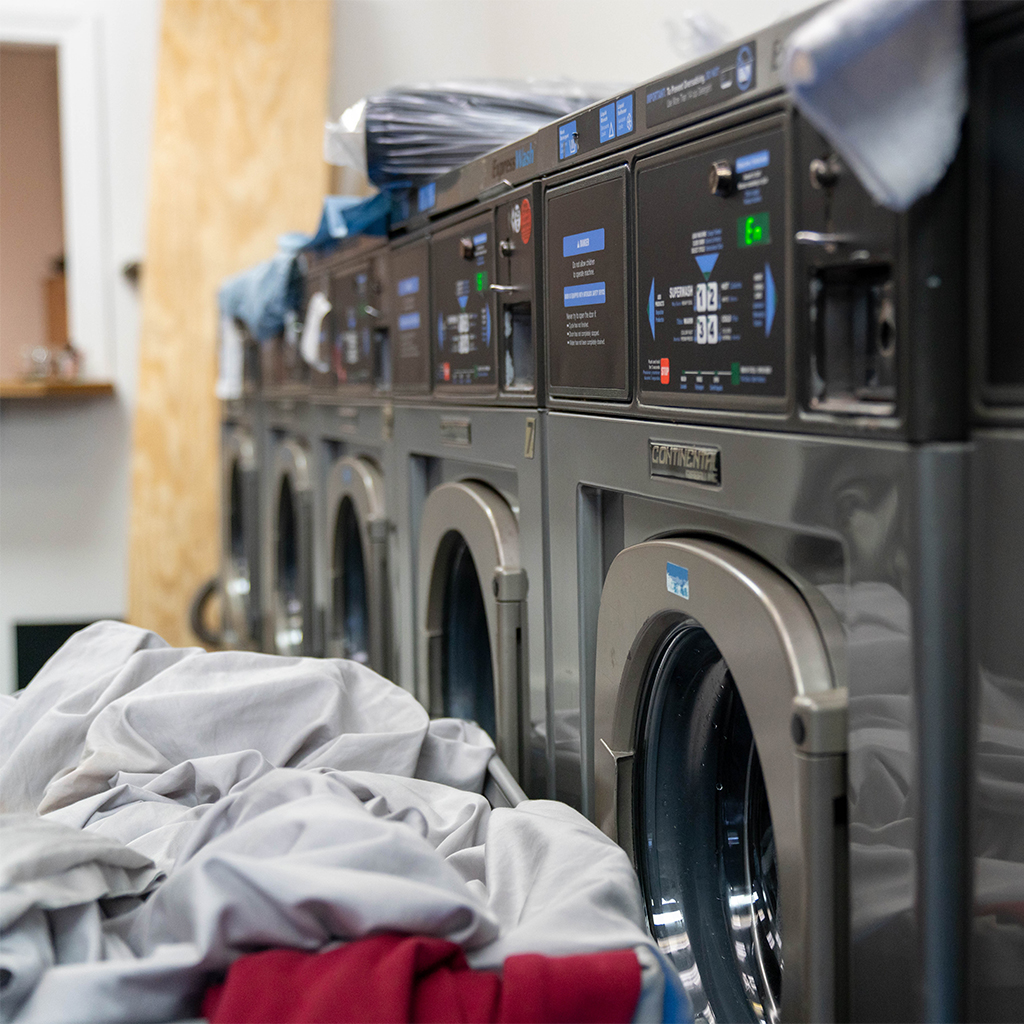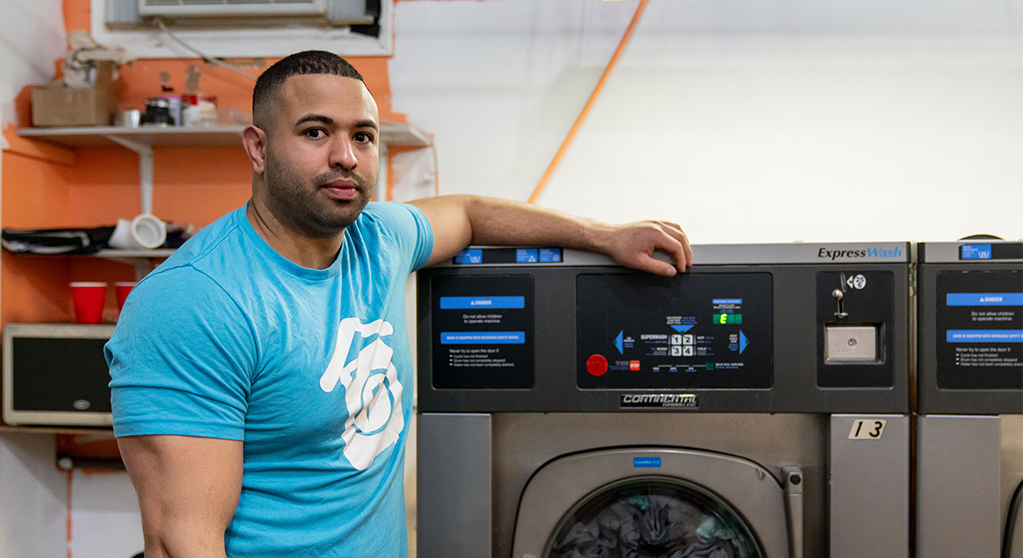App-based laundry business WashLoft spins up near Porter Square with disruption set to gentle

William Vivas founded the laundry business WashLoft in 2017 and how has a storefront near Cambridge’s Porter Square. (Photo: Hui-En Lin)
WashLoft, in a storefront near Cambridge’s Porter Square, looks like a traditional neighborhood laundromat. Actually, it’s an app.
Founder and chief executive William Vivas believes that with WashLoft he can reinvent laundry – what he calls the world’s most wasteful service industry, which he envisions with a more sustainable, innovative and consumer-focused future.
It runs on a fairly simple concept: Customers download the company’s app on their phone or other mobile device, place an order and schedule a pickup time. Within 24 hours, WashLoft will return the laundry, freshly cleaned at 1761 Massachusetts Ave.
Behind that straightforward premise, Vivas said, is a lot of complex machinery. Along with its customer software (available through Apple’s App Store), WashLoft has four behind-the-scenes applications that automate its processes and soft-mount laundry machines that exert up to 450 G forces on clothes. That ultrafast spinning, Vivas says, reduces how much water fabrics retain and the need for aggressive drying, along with the heat that wears clothing out.

WashLoft laundry machines at 1761 Massachusetts Ave. (Photo: Hui-En Lin)
“We’re providing a premium service, and we are still slightly cheaper than a lot of other laundry apps because this equipment also uses 30 percent less water than traditional washing machines,” Vivas said.
Regular, wash-and-fold laundry is $1.65 a pound at WashLoft with a minimum $15 order; delivery is $3.99 but free for orders of $30 or more – which is also the minimum for the business’ eco-friendly dry cleaning service. (A nationwide app-based service called Poplin that launched in 2018 is now in 48 states with an outsourcing model that charges $1 a pound for delivery the next day. That outsourcing means less assurance of quality and care, Vivas said.)
Using less water isn’t the company’s only sustainability goal. After participating in Cleantech Open, one of the largest accelerators for environmentally focused tech entrepreneurship, Vivas has infused sustainability into every part of his company. Most traditional detergents and softeners, he said, are petroleum-based; WashLoft uses plant-derived, hypoallergenic products. To scent clothes, the company uses organic essential oils instead of synthetic fragrances.
“We use technology to create more sustainable things,” Vivas said. “That’s what this company is all about.”
Scrubbing The Laundry Room
Vivas was raised in Newton and got started in business flipping collectible cards – and then collectible cars. He got the idea for WashLoft while studying business administration at Boston University. He said that after living in an apartment without a washing machine and, as a result, walking three blocks to a laundromat whenever he needed clean clothes, he knew there had to be an easier way. A few years later, Vivas learned to develop iOS applications and launched WashLoft in 2017. He sold his beloved 450 horsepower Nissan 300ZX twin turbo to build out the space.
“It was very sad to part ways with that car,” Vivas said. “I’m hoping to buy it back some day, if I can find it.”
WashLoft replaced The Laundry Room, which Vivas was familiar with from trips through Porter Square. While looking for a space for his own business, he was surprised to see The Laundry Room pop up for sale on industry forums. The owner had died, and his daughter was selling. “She didn’t want anything to do with laundry,” Vivas said.
After the sale, it took about a year to upgrade the space, which was “in dire need. We renovated everything,” he said, “out of pocket.”
A failed model
Online entrepreneurs have been trying to disrupt the laundry industry since at least the early 2010s. Few have seen success. Washio, founded in 2013, was one of the first and largest laundry apps before closing three years later.
“Washio was huge. They raised a ton of VC money,” Vivas said, referring to funding from innovation-focused venture capital investors. ““Their business model was just not good.”
The early laundry apps followed what one could call the “Uber model”: They connected customers to drivers much like a ride-sharing app. Those drivers took the laundry to third-party wholesale cleaners. The apps functioned as an intermediary.
That approach has problems, starting with the space between what you earn and spend: “When you use the outsource business model and are a platform company, the margins are absolutely dismal,” Vivas said.
Finding drivers is difficult too. Because drivers have so many options in the gig economy, with Uber to DoorDash being only the best-known of dozens, laundry delivery services struggle to compete for labor with apps in other industries that often offer better pay.
Disrupting the disruptors
WashLoft employs its own drivers and operates its own vans. That delivers not only better margins, Vivas said, but better customer service.
“We own the entire supply chain. That’s the difference between us and the other laundry apps,” Vivas said. “It makes it more of a reliable experience for our customers.”
Some have criticized laundry apps for a reliance on wholesale washing companies that puts more pressure on mom-and-pop laundromats facing already high costs. If local laundromats go out of business as a result, consumers could be stuck using the app.
WashLoft, Vivas said, avoids that pitfall too. By not outsourcing, it competes more with laundry services than laundromats. Customers can walk in at the Baldwin shop near Porter Square and hand laundry off to staff, but the facility’s washers are not open for the public to use.
There are other, more significant long-term problems for local laundromats, Vivas said.
“With how expensive commercial real estate is now, you’re going to see a lot of laundromats in the future shutter because the rents are just getting so high,” he said.
The laundry services closest to WashLoft on Massachusetts Avenue between Harvard and Porter squares were not concerned about the new competitor down the block. Owners and managers didn’t know what it was or even that it was there, they said when visited.
The next cycle
Vivas has big plans for WashLoft. He is building a facility that will grow his company’s commercial laundry operation, he said, and plans to add dry cleaning and uniform services. With 10 employees but around 5,000 customers, WashLoft is up 30 percent in revenue from this time last year, Vivas said, aided by savvy Google advertisement placements and his experience in search engine optimization – meaning that when people search for laundry services, the WashLoft website is likely to be at the top of results.
“We rank very well, because we’ve been online for a long time and are optimized to bring in traffic,” Vivas said. There’s also word of mouth. “We get a lot of referrals. We’re kind of known as a quality laundry provider.” While the App Store shows just 62 reviews, they give a cumulative 4.4 stars out of 5.
The company is only in metro Boston, but Vivas envisions expanding it to New York, Chicago and San Francisco. “That’s the type of market we thrive in,” Vivas said. “The more efficient our logistical routes are, the more profitable we are and the better we can pay our workers.”
Vivas is also doubling down on the sustainability that he said defines WashLoft. He is formulating his own all-natural soap, free from the chemicals in commercial detergents.
“We’re striving to create the most sustainable, organic and natural laundry products in the world,” he said.


